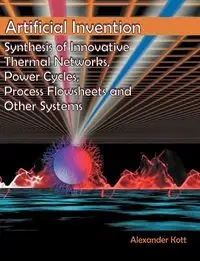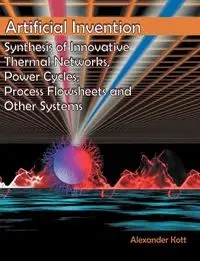Artificial Invention - Alexander Kott
Artificial Invention - Alexander Kott
- Synthesis of Innovative Thermal Networks, Power Cycles, Process Flowsheets and Other Systems
EAN: 9781581122640
Symbol
667EYB03527KS
Autorzy
Alexander Kott
Rok wydania
2005
Elementy
292
Format
18.9x24.6cm
Język
angielski

Bez ryzyka
14 dni na łatwy zwrot

Szeroki asortyment
ponad milion pozycji

Niskie ceny i rabaty
nawet do 50% każdego dnia
Niepotwierdzona zakupem
Ocena: /5
Symbol
667EYB03527KS
Kod producenta
9781581122640
Autorzy
Alexander Kott
Rok wydania
2005
Elementy
292
Format
18.9x24.6cm
Język
angielski

This dissertation proposes a computational technique for automated "invention" of conceptual schemes of thermal systems. The input provided to the automated problem solver is a description of the streams entering and leaving the system. The output is a network of elementary processes: compression, expansion, heating, cooling, and chemical processes. The problem solver seeks a network that is feasible, and offers an optimal (or at least favorable) combination of energy and capital costs. The synthesis process is modeled as a heuristic search conducted in a state-space of all possible design versions. The main ideas of the dissertation have been implemented in a computer program called TED, which invented a number of nontrivial schemes.
TED starts with an initial state (or states), which may be either proposed by the user or generated automatically. TED evaluates each state using a special technique of exergy analysis applied to an infinitesimal temperature interval. This allows us to describe the thermal system by several integral characteristics which are functions of temperature. One particularly important integral characteristic - a measure of system's Second Law infeasibility - is introduced in this work; it allows a uniform treatment of both feasible and infeasible design states.
TED then selects the most promising of the available designs. This selection is guided by a specialized search algorithm BP* which is shown to be probabilistically admissible. The results of the exergy analysis are used to perform a look-ahead evaluation of the design states. BP* also uses backpropagation of the state evaluation function to reduce the amount of backtracking.
TED then improves the selected design by applying one of the transforming operators and thereby generating a new design. Each transformation involves addition of an incremental network of thermal processes to the original state and reduces either irreversibility (exergy loss) or infeasibility of the thermal system. The application of the transformations is controlled by a heuristic move generation function that selects the most promising transformations. The new design is added to the database of the available design states.
The search continues with these evaluate-select-transform iterations until an (approximately) optimal design is found.
EAN: 9781581122640
EAN: 9781581122640
Niepotwierdzona zakupem
Ocena: /5
Zapytaj o produkt
Niepotwierdzona zakupem
Ocena: /5
Napisz swoją opinię

